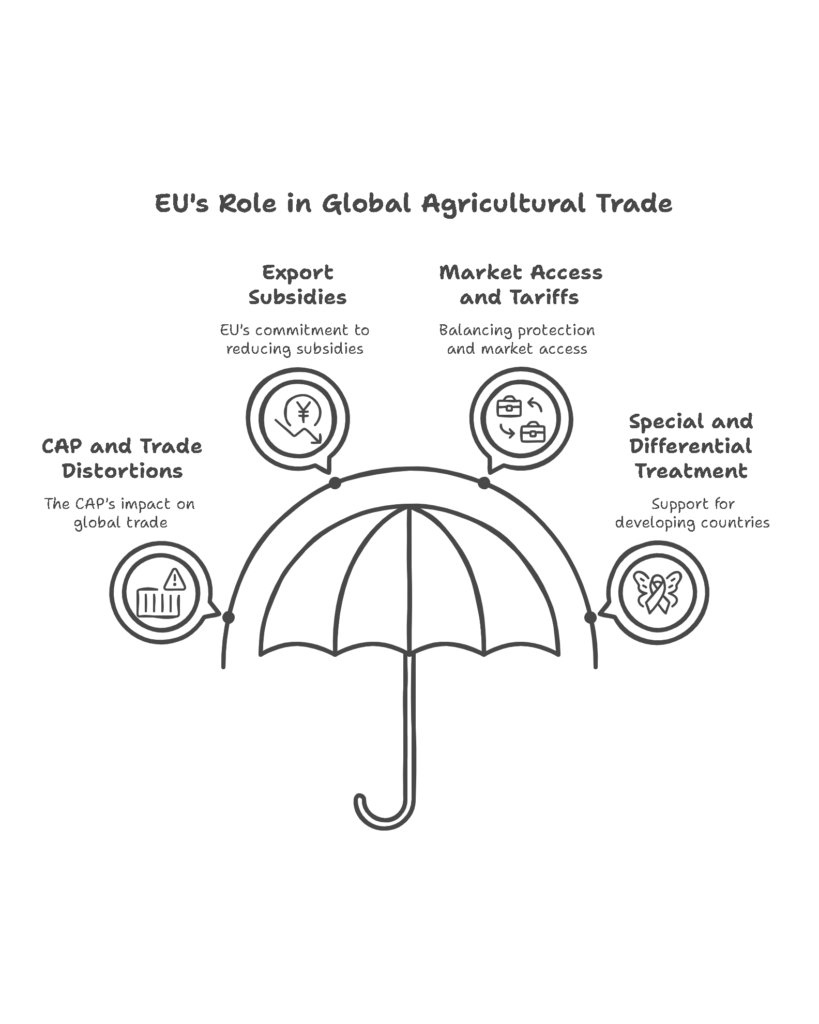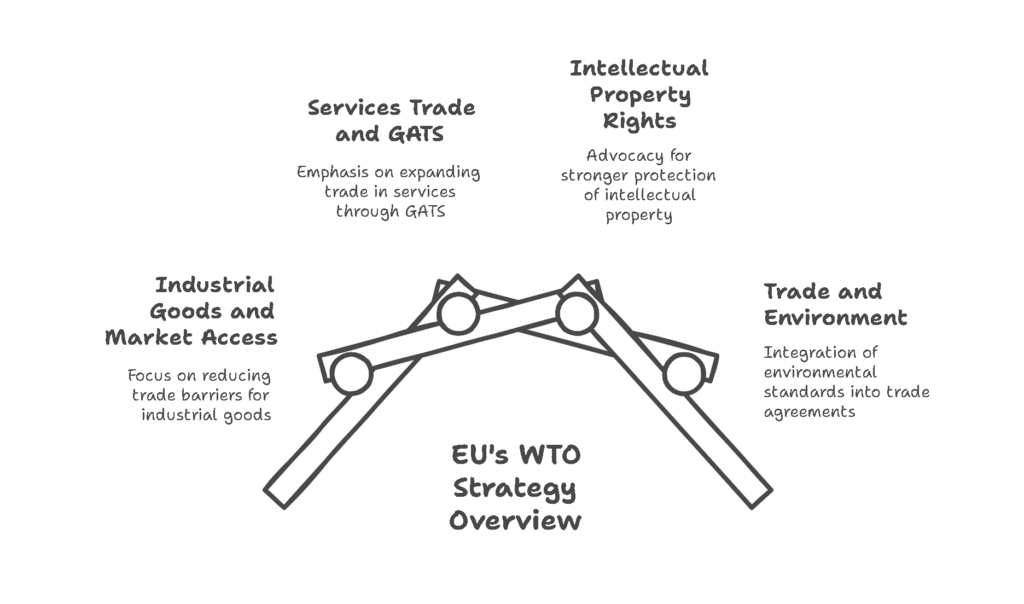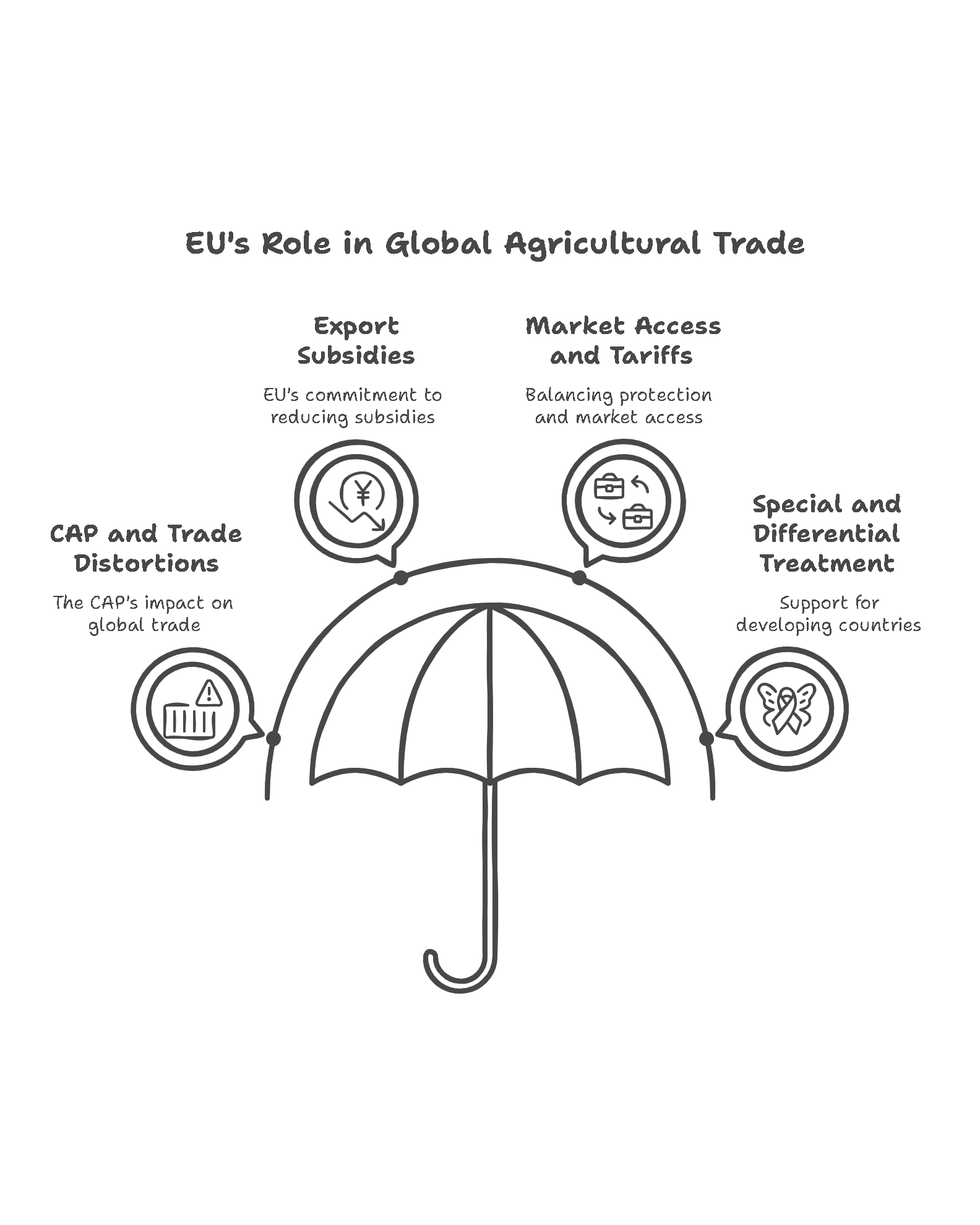The European Union (EU) is a key player in the global trade system, and its role at the World Trade Organization (WTO) is central to shaping international trade policies. As one of the largest trading blocs in the world, the EU negotiates trade agreements, disputes, and trade policies on behalf of its 27 member states. The EU’s position at the WTO on agricultural and non-agricultural issues reflects its priorities, economic interests, and the domestic political realities of its member states.
I. The EU’s Position on Agricultural Issues at the WTO
Agricultural trade has been one of the most contentious areas of WTO negotiations, and the EU has been actively involved in shaping the rules and agreements concerning this sector. The EU’s agricultural policy, particularly the Common Agricultural Policy (CAP), influences its approach to trade in agricultural products.
- Common Agricultural Policy (CAP) and Trade Distortions:
- The CAP, which includes subsidies, price supports, and rural development funding, plays a significant role in shaping the EU’s position on agricultural trade. The EU aims to support its agricultural sector, ensure food security, and protect rural economies. However, this has often led to criticisms from developing countries and other WTO members who argue that such subsidies distort global agricultural trade and hinder free trade.
- At the WTO, the EU has been involved in negotiations under the Agriculture Agreement, which was established in 1995 as part of the Uruguay Round of trade talks. This agreement requires member states to reduce domestic support, export subsidies, and market access barriers to agricultural products.
- Export Subsidies:
- Historically, the EU has been a major exporter of agricultural goods, and its use of export subsidies (payments to producers to reduce the price of exports) has been a point of contention in WTO negotiations. These subsidies were seen as unfairly distorting global markets by encouraging overproduction in the EU and flooding international markets with cheap goods.
- In response to growing pressure, the EU made significant commitments to reduce its export subsidies. The 2015 WTO Nairobi Ministerial Conference was a turning point, as it marked the end of export subsidies for agricultural products within the EU, a major victory for countries advocating for free trade in agriculture.
- Market Access and Tariffs:
- The EU supports the reduction of trade barriers in agriculture but also insists on protecting its sensitive agricultural sectors, such as dairy, meat, and sugar. The EU often applies higher tariffs and quotas on agricultural imports to protect its domestic market. This protectionist stance is sometimes at odds with the interests of developing countries, which seek greater access to the EU market for their agricultural products.
- In WTO negotiations, the EU has called for a balanced approach that protects European farmers while also providing better market access for producers from developing countries.
- Special and Differential Treatment (SDT):
- The EU has expressed support for the principle of Special and Differential Treatment (SDT) for developing countries in WTO agricultural negotiations. This means providing more lenient trade terms, such as longer timeframes for implementing commitments and lower reduction targets for subsidies and tariffs. The EU has supported measures that enable developing countries to protect their food security and rural economies.

II. The EU’s Position on Non-Agricultural Issues at the WTO
In addition to agriculture, non-agricultural trade issues such as industrial goods, services, and intellectual property are central to the EU’s WTO strategy. The EU is a strong advocate for global trade liberalization, and its position on non-agricultural trade issues reflects its commitment to free trade principles and its role as a major economic power.
- Industrial Goods and Market Access:
- The EU has consistently pushed for the reduction of tariffs and non-tariff barriers on industrial goods in global trade. It seeks to ensure that European companies can access international markets without facing excessive restrictions.
- The EU has also advocated for the abolition of non-tariff barriers such as technical regulations and standards that may impede trade, especially in areas like chemicals, electronics, and machinery. The EU argues that removing such barriers would enhance global efficiency and provide consumers with better access to high-quality products.
- Services Trade and the General Agreement on Trade in Services (GATS):
- The EU is a strong proponent of expanding trade in services, which constitutes a significant portion of its economy. Services such as financial services, telecommunications, and professional services are key areas of interest for the EU in WTO negotiations.
- The EU has actively supported the liberalization of the global services trade through the General Agreement on Trade in Services (GATS), which seeks to reduce barriers to the cross-border trade of services. The EU has pushed for greater market access for its service providers, while also ensuring that the regulatory frameworks of host countries are fair and transparent.
- In particular, the EU has prioritized the removal of barriers to financial services, telecommunications, and transport services, which are critical to its global competitiveness.
- Intellectual Property Rights (IPR):
- The EU has been a leading advocate for stronger protection of intellectual property rights (IPR) at the global level, both in the WTO and other international forums. The Agreement on Trade-Related Aspects of Intellectual Property Rights (TRIPS), which was negotiated as part of the Uruguay Round and is part of the WTO framework, is a key instrument for the EU in ensuring that intellectual property is adequately protected across member states and in global markets.
- The EU supports the enforcement of intellectual property rights as a means to foster innovation and creativity. It has also argued for the extension of intellectual property protection to new technologies, such as software and biotechnology, to maintain a competitive edge for European businesses.
- Trade and Environment:
- The EU has increasingly linked trade issues with environmental concerns at the WTO. It has advocated for the incorporation of environmental standards into trade agreements to ensure that global trade does not undermine sustainable development.
- The EU has promoted the idea that trade policies should align with global environmental agreements, such as the Paris Climate Agreement, and has sought to ensure that environmental considerations are factored into the negotiation of trade rules.
- One of the key areas of focus for the EU is the trade in environmental goods and services, including renewable energy technologies, waste management, and environmental protection technologies. The EU aims to create a global framework for the trade of such goods that supports sustainable development and addresses climate change.

III. Conclusion
The European Union’s position at the WTO is shaped by a combination of economic interests, domestic policies, and global trade objectives. In the agricultural sector, the EU has made significant strides in reducing export subsidies and supporting developing countries, while still prioritizing the protection of its agricultural sector. On non-agricultural issues, the EU has been a strong advocate for the liberalization of trade in industrial goods, services, and intellectual property, while also emphasizing the integration of environmental concerns into global trade rules. Through its active engagement in WTO negotiations, the EU seeks to balance its internal interests with its broader commitment to global trade liberalization and sustainable development.








Leave a Reply